The Indonesia expat reference thread
Last activity 20 November 2024 by ginasmailnc
27108 Views
171 replies
Subscribe to the topic
Post new topic
The basics
The local currency is the Rupiah, it being the only legal form of tender within Indonesia except for bartering.
Any shop or business of any kind, that including rental properties, MUST use the Rupiah if the transaction is to be legal. Anything priced in US$ should be ignored (Mostly because it's likely to be a rip off aimed at tourists or expats with more money than experience).
BITCOIN and other such things are illegal for any and all internal transactions.
Money here is in big numbers (The smallest note being Rp1,000) but don't let the thought of spending four thousand to park a car put you off.
You get used to these numbers pretty quickly.
The big temptation is converting back to your home money - Don't.
The conversion will make things sound really cheap so you'll get ripped off all the more as you aren't considering the local economy. The price you're told might very well be cheap if it was for sale in the UK or US, but it could be three times the normal price for Indonesia.
However, as a foreigner, you'll get ripped off at first but less so when you stop converting and start working out if locals would buy it at that price.
You can minimise this with a trip into an Alfamart or other fixed price shop.
See how much they charge for a bottle of water and a few essential items.
That'll give you a base to work with.
If you use a warung (small shop), they probably buy at the same price such as Alfamart sell at so expect to pay a little more.
As a note, locals commonly miss the thousand or million - you'll get used to how it works (over time).
Local salaries compared to what expats commonly earn
Most working expats earn more in a day or three than many locals see in a month.
That in mind, allow a little rip off or two; it's good for the soul.
I allow a thousand or two but never allow them to charge stupid prices.
The lowest I know of in Jakarta area (For a real job) is just over Rp1 million,
Street traders may well earn less.
A degree educated professional such as a teacher may earn around 5 to 7 million/month, but many earn less.
Consider this information before posting a thread asking if Rp30 million/month is enough to live on.
Bank accounts
Foreigners may open accounts legally if they hold a KITAS or KITAP immigration document.
If you don't have one of these, it's illegal except for a few special account types.
https://transferwise.com/au/blog/openin … -indonesia
you’ll find three different account options to choose from. The options are the Limited Balance Tourist Account (USD $2,000 - USD $50,000), Unlimited Balance Expat Account (From $50,000 and up) and the Special Balance Expat Account (Balance must exceed 1 million USD). To open these accounts you would just need some combination of a passport and one additional document (e.g reference document from a bank in your country of origin, domicile letter of the expat, identity papers of the spouse, copies of residence contracts, or a credit/debit card). Also, these are (non-rupiah) bank accounts and must be denominated in USD.
An account is easy enough to open, but (excepting the above) banks will ask for originals of various documents including KITAS/KITAP, passport, and your local ID card SKTT/KTP.
Check with the bank as the requested documents have a habit of changing from branch to branch.
Please be aware, opening an account without the proper documentation has been done in the past but that's mostly stopped as government rules are being enforced.
I've heard of foreigners opening accounts without the documents required by law, but that leaves the account holder in danger of losing their cash if the account is noticed by the powers that be.
Your ATM card is usually instant, but does have restrictions. It can be used with an ATM and for instore purcheses, but you can't use it for telephone or internet transactions.
Some banks issue ATM cards with Mastercard and other international logos, that meaning you can use them outside the country, but you have to ask or you may get a standard one without them on.
Debit cards with your name on and all the details required for internet and telephone transactions are available on request, these taking around two weeks to obtain. Banks offer a series of cards that allow different ATM daily limits and different limits on ATM transfers. You pay a monthly fee on all types of card but you'll find the differences in cost are minor so it's often worth taking the top card type.
BCA main branches have a card issuing machine so the process is quick and easy.
The security guys operate the machine for you so it's extremely easy to get a new card.
The most popular bank here seems to be BCA, a very good bank with a lot of branches and a lot of ATMs, but those tend to have long queues at busy times. I generally advise using them at quiet times, and a bit of forward thinking allows that.
They, as with other banks, have very good online banking that works very well from the internet or mobile phone app.
I've used both systems without the slightest problem.
BNI is another very good bank, but they have fewer branches and fewer ATMs, but generally shorter queues.
Another new player is Jenius, an app based account from BTPN. You sign up online (You'll need ID and Tax cards), and all your banking is online. They send the card by post, and that has your name, a 16 digit number and 3 number code on the back. It also has the Visa logo. I keep it at around a million and use it for shopping. If I do get skimmed in a dodgy shop, the most they can get is a million. I transfer from other accounts, but use that card almost exclusively.
Bank loans and credit cards
These are available for foreigners but banks tend to be very careful who they grant/issue them to.
Car loans tend to be arranged via the car dealer, not your bank.
ATMs and internet banking
All local banks have ATM systems, many accepting several banks' cards, not just their own. Most will accept foreign bank cards and credit cards, but there have been some issues with older, non chip and pin cards, many from some US banks. I had a few problems for a while, but nothing for the last couple of years.
They all accept the usual logos, Visa, Cirrus, Maestro, mastercard and so on.
I tend to use BCA and BNI when I use a foreign issued card but other banks will accept them as well.
Using a Rp100,000 machine means you can take out a greater amount each time (Usually Rp2,500,000) so your bank charges tend to be lower as it's commonly by transaction, not just how much you take.
ATM Transfers to different Indonesian banks
It's possible to transfer between different banks for a small charge, but you have to use a bank identifier code. The ATMs are programmed with the lists but the most common are:
BNI - 009
BRI - 002
BCA - 014
Mandiri - 008
There are some problems with skimmer gangs but sticking to ATMs in shops and malls will mean you're unlikely to get caught out by the thieves.
Internet banking is generally safe and it's very handy. Banks will, on request, provide you with an internet banking secure key. I mostly use BCA's internet service and I'm happy to report it works well. I now pay most bills using it and it can be used to transfer money to accounts and so on. These also allow you to top up pre-paid cards appropriate to the bank in question, Mandiri allowing etoll top up and so on.
The system works well and is available in English.
Pre-paid debit cards
These are available in many shops and you don't need a bank account to have one.
You can have as many as you like.
BCA's Flazz and other prepaid cards are quite popular in Indonesia.
I think every bank has at least one, but these are the two I find most useful, mostly because I can pay for toll roads, parking and all the shops I use most accept them.
They're basically cash, but without all the messing around with money and it avoids the loose change that quickly builds up in your pockets disappears.
Transjakata buses require a prepaid card (Flazz, emoney and all variants, and Brizzi all work) as they won't accept cash, and they can be used it to pay for car parking and many other things.
They can be topped up in thousands of places, including the given bank's ATMs, any of the shops that accept them, and the bank's app.
All cards have a maximum load of one million Rupiah.
Jan 2022 update
I have now scrapped all my prepaid cards except BCA Flazz.
My old generation 1 card could only be topped up using an ATM or at a shop, but my new Gen 2 card can be topped up using the BCA app. The thing is accepted at both of my favourite supermarkets and I can use it on toll roads.
Scams
Every country has its scam artists, Indonesia being no exception.
Most are limited and unimaginative but professionals are getting in on the act now so watch out for more sophisticated stuff coming along.
Watch out for people hanging around in shopping centres or supermarkets suddenly stopping you, explaining how they're students collecting for charity.
They commonly want a one off payment.
Their ID cards look very professional, but they're fake.
The people using stands are genuine but one off people hanging around are always scammers.
A polite "No thank you" and look around for a security guard.
If one is there at the time, wave him over and the offenders will be kicked out.
Traffic lights often see 'volunteers' collecting for whatever - many are collecting for themselves.
Again, a polite refusal is best.
Violence from these people is uncommon, so remain polite and avoid confrontation and they'll go away and try to scam the next people.
Those in school uniform are likely the real thing as their principal would kick the lot out of school if they used their uniforms for such a thing. These legitimate collections are conducted in groups, never individuals.
NEVER give money to kids begging - Apart from being illegal (Hardly enforced), many of the kids are not willing, some may even have been kidnapped and forced to work.
Many of the women with babies have hired the kids, and they tend to work in gangs
SMS scams have become rare since the introduction of the new security rules. As the thieves must register their SIM cards, they can't send SMS scams without being found out very quickly and arrested.
UPDATE- june 2020
SMS scams are back as the scammers have worked out ways to get around the number rules. Any messages from hospitals, banks, the police, and other fakes asking for money or personal details should be ignored. I'm amazed the bank account numbers they give don't seem to lead to arrests, but maybe they do and I just haven't seen it.
A common one would be someone is in hospital and you have to send money to someone for emergency treatment.
Fair chance it's either illegal loans
One thing I heard of some years ago.
Woman approaches man.
Off to hotel.
Outraged husband knocks on door demanding cash or police.
A cop I know in Java explained that one - seems it's quite common in some areas.
ATM fraud
This happens all over the world, including Indonesia, but it is easily preventable.
Number one trick - try to use ATMs in supermarkets or other places with lots of security. It's far harder for a skimmer to be installed in places like that.
Many gangs operate in tourist areas, knowing a hit will bag them more cash that locals tend to have, so take special care in such places. The police have a crackdown from time to time but foreign gangs reappear and start again. This is likely to spread to domestic thieves so stick to ATMs in secure areas where possible.
Card copying
There are two ways they copy your card:
1 - They conduct a transaction in a retail outlet of whatever sort, and run your card through a second reader under the counter. If your card disappears out of your sight, even for a second or two, cancel the transaction, refusing to enter your PIN into their machine as there could well be a camera pointing at it.
2 - Card skimmers on ATMs.
These were easy to spot because they were of lousy construction but the new ones are far more professional.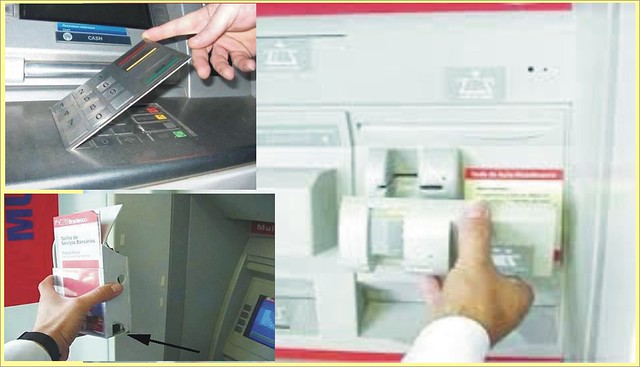
This short clip is worth a watch.
https://www.youtube.com/watch?v=WYMUA8umUz8
Fake websites/Cryptocurrency
These are pretty new in Indonesia but expect more as time goes on. I've just come across a 'koin' site operating from Aceh, they promise the world but the thing is run by a scammer operating out of Panama (or at least that's where the trail leads). The same people having run a lot of fake site scams over the years.
Fake sites are easy to spot if you take a little care and use your head before you get greedy.
Contactless card fraud
Gwmeath wrote:Just looking at your information on ATM fraud etc, not sure if the local banks issue contactless cards (never been issued one myself) but contactless fraud is on the rise especially in Singapore, and other locations could well be happening here or not far away
you can purchase a small wallet that the illegal apps on phones etc cannot get your card information same for car key fobs
I would imagine expats are the main targets in malls etc
TAX (NPWP)
Nobody likes to pay tax but it's one of the very few things we can never escape so it's essential to get a local tax code if you have an income in Indonesia.
This site will allow you to do everything
https://pajak.go.id/id
Once you've created an account, this page allows you to fill in your tax return online
https://djponline.pajak.go.id/account/login
The NPWP number is normally applied for by your employer but you might have to visit a tax office if you have no formal employer.
It's easy enough to do and all you need is your identification documents and your family card (if applicable), and photocopies to give to the office.
Just pop to your local tax office (KPP Pratama), fill in the forms, and wait at the counter for them to issue a tax card.
Very fast and very simple
Double taxation for earning from your home country may be avoided legally if your country has a tax agreement with Indonesia.
Note. NPWP will be be replaced by NIK over the next year or two but you won't notice much difference.
Payment apps
There are a wide selection of payment apps to choose from, but Gopay and OVO are probably the biggest two (at least in my area). None need a specific bank account but all are topped up from a bank account, and Telkomsel's LinkAja requires you to have one of their sim cards.
All the banks have apps now, the two I use most being BCA and BNI. I can top up Gojek, buy electricity tokens, and even pay in shops by transferring funds directly to their accounts. My last two computers were paid for that way. It's fast, easy, and the chances of fraud are minimal.
This post will be updated shortly.
Post to be updated and edited
Deposito accounts and Prioritas
Deposito accounts are fixed term, high interest bonds from the banks. Rates vary so shop around, but you can get a few percent over inflation with ease. They offer a safe option for people that have no interest in more risky investments.
Interest is paid either to your savings account or the deposito, and you can auto-rollover the bond rather than renew manually.
Terms vary, but the best interest rate is usually a three month commitment.
These aren't going to make you a fortune, but can make enough to leave you not worrying about having no work if you have a few billion in them.
Prioritas accounts are offered as a free service to customers with greater than 500 million in their accounts, including deposito savings.
I have 2 such accounts, both offering slightly different advantages and discounts, but both have free meals in airport VIP lounges and no queues at branches as you use their dedicated areas rather than the counters. Some branches, usually main ones for the area, have Prioritas suites complete with armchairs and waitress delivered coffee. One gets me a heavily discounted safety deposit box, a very handy service.
Note for Q1/2-22 - Interest rates are in the toilet at the moment so you aren't going to get much return. However, they are safe investments so I will be leaving most of my cash in them for the moment.
BCA / Jenius - How to avoid fraud
I strongly recommend using BCA - they make banking life really easy
BCA is an especially handy bank for many reasons, but the biggest one for me is their mobile app. Apart from being secure but easy to access, it has a good few tricks that will help you avoid most of the scams we see in Indonesia.
I no longer use my BCA card for anything - it sits at home unless I'm out of area (just in case)
I get money from ATMs using the cardless option in the app - No skimmers to worry about
Paying:
I most commonly pay using my Flazz card - you can top it up from the app (Not gen 1 cards - buy a new one if you have one of those)
I can transfer to any bank account I like using the app - That looks after a lot of mail order and places such as smaller computer shops.
I pay for everything else using a Jenius card. That's an online bank with a physical card. I transfer whatever I need from my BCA account, then use that. If a shop has a dodgy assistant who clones the card, the Jenius app lets you keep a close eye on spending so you can block the card yourself in a second. I keep the Jenius card at Rp1 million so that's the most a thief can steal.
The following is available in most of Indonesia, but I hardly ever saw it until I returned to Jakarta.
The Indonesian central bank came up with QRIS, a universal code that works with banking apps, Go-pay, Grab, OVO, and seemingly everything else.
Almost every small shop to major outlet takes it so there's a very limited need for cards.
I still use Go-pay in Indomaret as at this time they don't use QRIS.
I now pay most of my bills using QRIS, even in the local market.
The app may have undiscovered issues (Time will tell) but it looks secure at the moment.
Alcohol - Advice that could save your life.
Alcohol is quite expensive in Indonesia but don't let that tempt you into buying cheap stuff from local shops.
The chains, Alfamart, Indomaret, and so on, are no longer suppliers, but it is legally available in some other shops.
Some areas now have a total ban on alcohol sales. Whilst this is often unpopular with expats, it's very popular with most locals (or they simply don't care) as they don't drink anyway.
Many small shops sell cheap gin, whisky or whatever but the stuff is laced with methanol, bleach and various other nasties that'll likely put you in hospital or a morgue.
Locals sometimes die of it as two lads in Wonosobo did when I lived there but it's also been known to kill tourists.
https://www.dailymail.co.uk/news/articl … drink.html
The father of a young British backpacker who died after drinking poisonous gin has flown around the world in a bid to catch the people who sold her the lethal substance.
Brenton Emmons, 47, has travelled more than 8,000 miles to Indonesia after his daughter, Cheznye, tragically died there in April.
This stuff is common all over Indonesia so, to be safe, NEVER buy alcoholic drinks except in trusted outlets such as good hotels.
indostocks wrote:RE: Alcohol consumption. Very good advice, Mas Fred!
Just my extra 2 sen...
Western spirit are extremely expensive in Indonesia so if you can find a local source for safe alcohol then treat them well. Manado and environs are sources for palm wine. Flores and the Batak region of Northern Sumatra are also places where locally sourced distillates can be encountered.
Again unless you are buying properly sealed western liquor or beer make sure of your source.
I live in Yogyakarta so I don't drink except for the occasional can or bottle of San Miguel.
Ubudian
wrote:Booze in Bali:
Locally made arak is the high octane spirit of choice among the Balinese, and it is indeed potent. Various arak cocktails are served in many bars and restaurants, arak madu being probably the most popular. Arak madu is made with honey and lemon and its quite good.
Most Balinese will agree that the very best arak is made in the Amed, East Bali area. It is illegal to produce it without a license, but bootlegging is popular here and thus you can find arak at a great many warungs being sold in re-cycled glass bottles.
As previously mentioned, local made stuff is always a drink at your own risk proposition and there are periodic articles in the local papers of a local dying from consuming poisoned arak. Some idiots think that adding ground down mosquito coils to the arak increases its potency even more.
There is a licensed local distillery operation in Bali called Bali Moon. They recently came out with a very high quality vodka which rivals the best and in taste competitions regularly beats Stoli, Absolute and Sky. Its called Bali 9not after the famed criminals in our prison, but rather to reflect the number of times it is charcoal filtered. Retail runs about 180k for a 700 ml bottle and I think its only available now on Bali and nowhere on Javabut I could be wrong on that as their intention is to market this in Java eventually.
Bali is also home to a great micro-brewery called Storm Beer. This is a great quality brewery and they produce five varieties from a hearty stout to a light pale ale. They are having some problems as of late and production recently stopped. Hopefully their issues will be resolved soon and production resumed as it is the best beer available on Baliall imports included.
Dengue Fever/Malaria
You're more likely to have a heart attack because you're worrying about dengue than you are actually catching it.
Saying that, it is a problem, especially in the rainy season but you can do a lot to reduce your chances to nearly zero.
Mosquitoes tend to be around at night so, if you go out, wear long trousers, socks and shoes.
You're supposed to wear long sleeves as well but you'll melt if you do.
I use an easily bought insect repellent. There are many types available but I use Autan because it doesn't smell of much and I've never been bitten when I've been wearing it.
I don't follow my own advice regarding long trousers and shoes but Autan does the trick.
It also keeps the ants off my feet - they hate it as well.
Malaria is far less of a problem in the cites but take care anyway. I used anti malaria drugs when on holiday but that only lasted a few days as they had such a terrible effect on my digestion. It seems that's a common side effect.
Just follow the same advice as for dengue and your chances of the diseases are very slim.
Prescription drugs
If you intend to enter Indonesia with drugs, legal as they may be in your home country, check they're legal in Indonesia.
Indonesia has very strict laws concerning illegal drugs, laws that include shooting importers, so take extreme care.
Check your drugs are legal in the country you wish to visit/transit (Something legal in Indonesia might very well get you 10 years in a transit country).
Keep all drugs in their containers, including supplied labels.
Keep copies of prescriptions and a letter from your doctor.
Pack them in hand luggage, in a clear plastic bag.
When going through airport security, place the plastic bag on the tray so the officers can see you aren't trying to sneak anything past them. (Some may argue that will invite questions).
An email from the country's embassy (confirming your drugs are legal) would be great .... if you can get them to send you one.
Buying drugs in Indonesia
Take great care, buying only from chain outlets, never small one off shops.
There are a lot of fake drugs out here, so you might very well not get what you're paying for.
Hospitals tend to be more expensive, so try to buy from the shops. Supermarkets, amongst others, commonly have a reliable pharmacy in their complexes, as do all shopping centres.
https://en.tempo.co/read/news/2015/06/1 … ing-Center
Officials have also seized hundreds of various drug brands that are ready to be circulated. Those drugs do not have marketing authorization and some have also exceeded the expiration date. “The place is only used as a warehouse,” said Edi.
According to Edi, the suspects have been running the business for five months and says that the drugs were distributed to a number of pharmacies in the city of Bekasi.
There are all reputable outlets, including Guardian, Century, Kimia, and Watsons - All professional companies. There's always at least one in a shopping centre, and they have branches all over Indonesia.
Don't even think about bringing illegal drugs into Indonesia, there's a better than average chance of watching a firing squad from the dangerous end, and the president has made it very clear, he won't help you get off.
NOTE - Even small quantities of what would be considered a nothing drug in many countries, sometimes even legal, can get you into a prison cell in Indonesia.
Shoot to kill policy
Excuses aren't accepted, you're guilty (regardless of the rights and wrongs of the situation)
Note - BNN, the Indonesian anti drug agency, has adopted a shoot to kill policy, and the police have followed suit.
The upshot is easy enough, the officer decides if you're resisting arrest and, if (in his opinion) you are, he shoots you dead. Investigations don't happen and human rights aren't even considered so I very strongly suggest you don't carry illegal drugs in Indonesia.
Disabled facilities in Indonesia
Those with mobility problems, especially wheelchair users will have problems here.
There are no provisions at all outside the newer shopping centres and offices of newer large businesses.
All the new centres have disabled toilets and ramp entrances, but these are about the only places with access designed for wheelchair uses. The pavements (Sidewalks), if they have them at all, are commonly rough and have steps to get up and down, that and bars designed to prevent motorcyclist using them but also blocking wheelchairs.
You'll find most public transport is all but useless to you if you have any sort of disability that slows you down when walking or makes stairs difficult to climb. The new TransJakarta buses have wheelchair facilities but they are of little use as access to most stops aren't wheelchair friendly.
There's almost nothing outside the larger towns and cities for disabled people.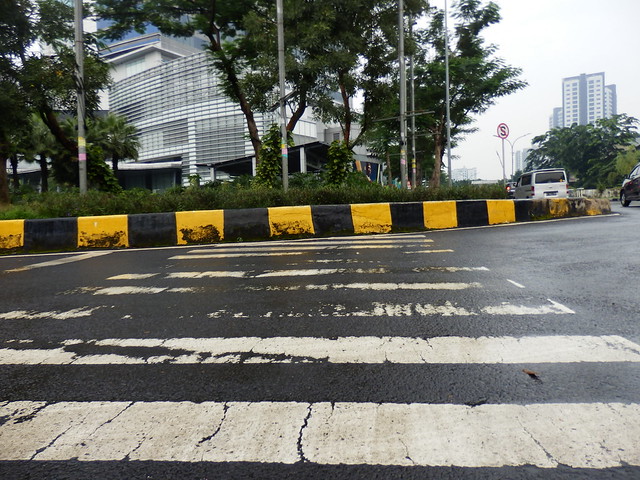
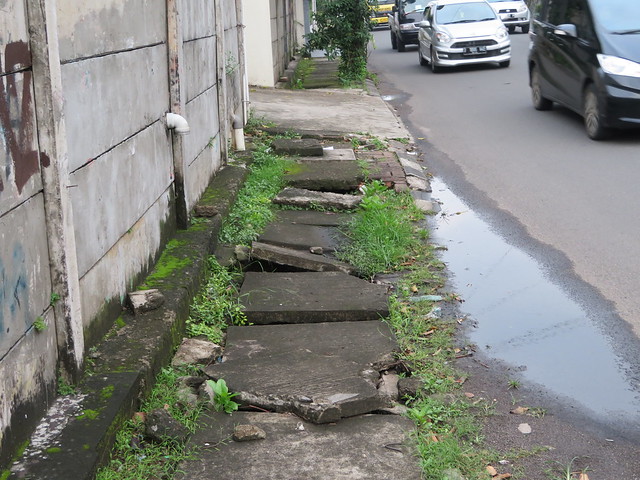
Birth control / Sex / STDs.
Birth control
Some people believe Indonesia has strict controls on birth control but that's far from the case, much of the reason being the Indonesia's problems concerning overpopulation.
Condoms are available easily without the slightest question in most mini marts and the pill is just as easily available from most pharmacies without need to see a doctor.
As with any potentially dangerous drug, I would strongly recommend seeing a doctor if you intend to use oral contraceptives, but they are available without prescription. 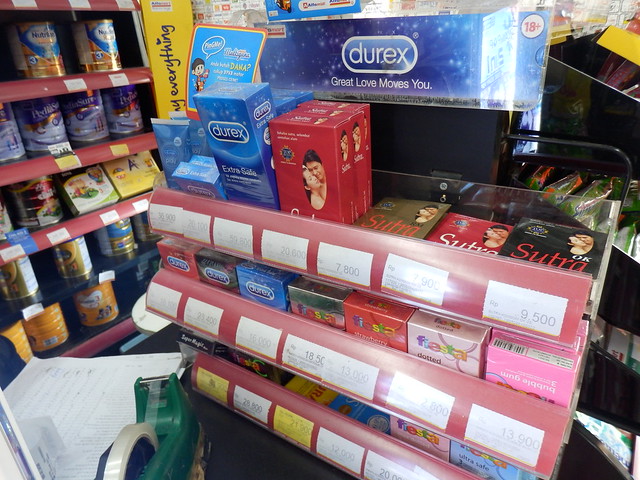
STDs are a problem in Indonesia, but they are MOSTLY confined to given groups, these being sex workers, injecting drug users and the gay community.
However, the problem is also around in the many bars where the richer Indonesians and foreigners hang out. Free sex can easily come with a free STD, and HIV is in there.
SEX
Another issue is gold diggers, mostly women who hunt out foreigners and are willing to go all the way for a few shopping trips. This can be dangerous to the wallet and your health.
I would strongly advise leaving sex alone as far as casual meetings in bars goes, but that's up to you.
If you do engage in carnal pleasure, wear a raincoat.
Sex and social diseases.
Some expats come here and enjoy prostitutes of whatever kind but this has dangers.
This is illegal and police do raid places from time to time so you could find yourself locked up with the potential for being deported, but the main issue is STDs.
AIDS isn't a massive issue here but there are still plenty of deaths so, if you engage in dodgy sex with professionals or have sex with high risk groups, a blood test is a good idea.
I don't use prostitutes, know any drug abusers or have any gay relationships so I don't know any of the following personally thus these aren't recommendations, just possibilities.
Click on the link for further info and more options.
http://www.jakarta100bars.com/2016/03/s … karta.html
Klinik Yayasan Angsamerah
Jl. Panglima Polim Raya 6
Blok A, Kebayoran Baru
Jakarta Selatan 12140
The new Angsamerah Clinic will be located on Jalan Johar.
Website (with English version): http://angsamerah.com/
Phone number: +62 21 724 7676
Bio Medika
Location:
In Jakarta: Kedoya, Gandaria, Kelapa Gading, Mangga Besar, Semangan, Angke. More details on their website: http://www.biomedika.co.id
Phone number: 021 568 9942-43
International SOS
SOS Medika Cipete Clinic
Jalan Puri Sakti No. 12, Cipete - Antasari
Phone number: 021 7505973
SOS Medika Kuningan
Menara Prima 2nd Floor, Mega Kuningan
Phone number: 021 5794 8600
Gay sex
Gay sex or any other gay relationship is perfectly legal here (outside prostitution), it it isn't exactly welcome either. I know a couple of seriously camp blokes and no one bothers them in the slightest, but you have to be aware there are more extreme members of the population who aren't past 'gay bashing'. Gay clubs are raided from time to time and clients ridiculed, but there's little to charge anyone with so no worries about prison time unless you're up to something else as well.
However, even an arrest with no charge has the possibility of becoming a problem with visa applications.
Health insurance/BPJS
BPJS is available for many expats but it's more an emergency thing if you don't have other insurance. Expect queues and waiting lists if you use it, but it can also save your life.
Expats included in this scheme by force when they work here will probably never use it so treat it as a charitable donation rather than a rip off. The payments are tiny, more so when compared to many expat salaries, but your donations can be a lifesaver for poor people who can't afford medical insurance.
There are many health insurance policies available ranging from the government run BPJS through to very expensive 'do everything' products that ship you off to Singapore for treatment.
The first thing you need to consider is your chances of needing treatment. Accidents happen but the vast majority of younger people remain healthy so won't use their cover at all.
I would advise looking at the middle ground, that being policies issued by the banks.
Many banks have affordable deals that offer pretty good returns in the event of illness, at least one major bank using the payments as an investment scheme over several years so you actually get your money back.
I would strongly suggest walking away from the large international companies that base reps in shopping centres that walk up to you and ask how much you'd like to pay, but avoid all talk of what you get for your money. One very silly woman started off with 12 million/month payments, an absolute rip off job even if her company had a big name and the fee was actually as advertised.
Another way is to wander into a local hospital and ask which insurer they would recommend- You'd be surprised at who they say not to use because those companies are bad payers - A big name that hangs around in shopping centres.
Gwmeath wrote:Just one thing to add on the insurance part/ BPJS
This is especially for expats who are employed by both Indonesian and foreign companies using KITAS once your KITAS has been cancelled you can claim 100% of the BPJS back including employer contributions(probably closer to 90% to be honest) (as long as a claim wasnt done) 99% of the time expats working for foreign companies tend to have insurance but its a requirement to have BPJS
0 tax for first 60/70% of claim and I think its 10% tax for the remainder
Avoiding food poisoning
A few bits and bobs about local (and not so local) food can be found here.
https://www.expat.com/forum/viewtopic.php?id=592042
Street food takes a little getting used to in order to get the right thing at the right price, but without free food poisoning.
There are some tricks to deciding where to eat.
1 - If the place looks really dirty (by Indonesian standards), the food is probably dodgy.
2 - If there is a crowd, it's probably nice (and safe) If there's a crowd at every other stand but not that one, it's probably rubbish.
3 - Take note of how they wash the dishes. If they have running water, it's probably safe to eat from their plates. If not, order wrapped up (dibunkus) and use the plastic cutlery they give you for free.
I keep some disposable cutlery in the car, just in case.
I believe much of the problem isn't bad food, but it being served on dirty plates. I've seen them washed in drains - pretty terrible, but true.
4 - Most street food (Kaki lima) people that wander the estates are fine. If they aren't, no one buys so they go bust pretty quickly.
Vaccinations
The British government recommends a series of vaccinations before travelling to Indonesia.
As these are harmless, it's a good idea to follow the advice.
https://www.fitfortravel.nhs.uk/destina … /indonesia
Confirm primary courses and boosters are up to date as recommended for life in Britain - including for example, seasonal flu vaccine (if indicated), MMR, vaccines required for occupational risk of exposure, lifestyle risks and underlying medical conditions.
Courses or boosters usually advised:
Diphtheria
Hepatitis A
Tetanus.
Hepatitis A is never a bad move, Tetanus is absolutely essential.
Other vaccines to consider:
Hepatitis B
Japanese Encephalitis
Rabies
Typhoid.
Rabies is extremely unlikely and hep B only really applies if you intend to get naughty. Japanese Encephalitis is unlikely to be any issue for most expats but it's worth considering if you live or spend time in rural areas. Typhoid vaccinations are also a good idea, more so if you eat street food.
Selectively advised vaccines - only for those individuals at highest risk: Cholera.
Yellow fever vaccination certificate required for travellers over 9 months of age arriving from countries with risk of yellow fever transmission.
MMR vaccines
These can be difficult to find MMR in Indonesia but the following place could be of help.
I have used their services and found the helpful, professional, and their vaccines are known to be real.
I can recommend them
klinikvaksinasi.com
021-4220214 or 021-4248790
Monday - Friday 08.30 am - 8 pm
Sat 8 - 12 am
on appointment schedule
Update March 2022 - MMR is now much easier to find, but you may have to visit a few hospitals or clinics to find it.
Vaccinations and schools
Many schools expats are likely to apply to will ask for the student's vaccination records and failure to provide may result in the application being rejected.
Walking
Much of Indonesia doesn't have pavements (sidewalks) and the parts that do don't always look after them. Many pavements in cities are concrete covers over storm drains but with a lot of the covers broken or missing.
Where there are properly designed sidewalks, it's very common to see street hawkers take them over and blocking them totally.
You should be very careful when walking as there are many potholes so a twisted ankle awaits those who don't care care.
In traffic jams, it's very common for motorcyclists to use the pavement as well as the roads, and even pedestrian footbridges.
Where there is no pavement, Indonesians walk with traffic flow rather than against it, that leaving then vulnerable and at the mercy of drivers who might well be playing with their phones whilst driving (very common here). I strongly recommend walking towards oncoming vehicles and watching them very closely.
Crossing roads on foot is a dangerous affair as vehicles rarely give way for pedestrians and will usually ignore designated crossing, even light controlled ones.
Very busy streets often have people helping you across the road, the normal thing to do is pay them one or two thousand Rupiah.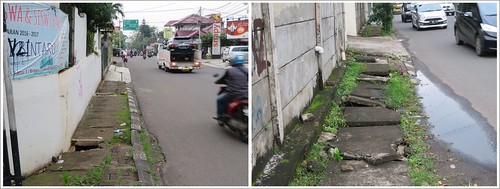
The roads
*************
WARNING - DO NOT DRINK AND DRIVE IN INDONESIA
This can get you a variety of punishments from fines, through prison time, to being beaten to death by an angry mob.
*************
Get a dashcam and make sure it's recording at all times.
If anyone is considering driving in Indonesia, watch this first.
These caused accidents but most get away with stupidity on the roads - I have no idea how they manage to, but they do.
These things are pretty common on roads here, especially the crazy overtaking and totally ignoring traffic lights..
https://www.youtube.com/watch?v=gpNJkfhaTCc
Most people have no idea how bad traffic is in Indonesia until they see it.
Traffic lights are advisory at best and commonly ignored; leading to total chaos.
https://www.youtube.com/watch?v=P-5QlRrMQfA
The lights were out of shot most of the time but they are there.
Red, green, whatever - no one much cares.
Most of the police corruption has been stamped out now but there's still some about so take a little care.
It is worth a note, any accident is your fault regardless of who is to blame, even accidents you witnessed but where not part of. Keep that dashcam running all the time so you have proof it was nothing to do with you. If your can picks up an accident, transfer the video to your phone or computer as soon as possible in case someone decided to blame you in the hope of getting some cash out of you - it happens.
Expect people to overtake you but turn left before they get clear or somebody to run a red light or just fly out a blind junction without a thought of looking to see if the road is clear.
Traffic lights are hardly ever bothered with in many placrs. They're there; just ignored.
Also note - Most people will turn left at any junctions regardless of light colour - this is accepted as normal here.
Motorcycles rarely have insurance, but very commonly cause accidents. The most common are minor but a pain in the bum:
* Motorbike overtakes on the left when there isn't any room. They scratch your car and/or fall off. They will blame you in either case even though they broke the law.
* Motorbike overtakes on the right when there isn't any room or you have your right indicator on as you're turning right. They scratch your car, run head on into oncoming traffic, and/or fall off. They will blame you in either case even though they broke the law. These are very common so keep an eye on your mirror when turning right.
* Motorbike runs into the back of you when you stop for whatever reason, even traffic lights. As before, they will often try to blame you
For all of the above - Stay calm and live with whatever damage they cause. You have bugger all chance of getting any cash out of them so there's little advantage in getting stressed out and angry.
I had (yet another) mini-smash the other day. I stopped for the traffic lights queue, the woman on the bike behind me didn't bother. The bang was a lot louder than the damage and the dent came out easily, but I asked her for her licence and registration. The only hope you have of anything is if they aren't riding legally as the cops will take their bike and they know it.
Angkots are mini city busses, the majority of drivers being as mad as hatters. They're mostly dangerous and give give a damn about accidents because the mini vans are mostly beaten up old wrecks and the cops do nothing about them anyway.
They cause a large number of town and city traffic jams, will go in the left hand lane to turn right (and the right to turn left), and will drive like a bloody idiot in order to overtake you, then slam their brakes on to pick up a passenger.
These are nothing but a dangerous menace so keep an eye out for them and always try to avoid them when possible.
If there were any enforced speed limits (or even signs advising of a limit), speeding would be normal when you aren't in a traffic jam.
The idea of driving in Indonesia is; I'm first and I don't care about what's in the way or, if something is already there; it'll get out of the way.
They seem to think this applies to brick walls as I've seen on a couple of occasions.
The police do almost nothing to enforce any little rules so seeing a kid riding a motorbike, but unable to put his feet to the floor because he's only five years old, is pretty much normal in country areas.
A country area is anywhere there isn't a main road.
Because of this dangerous stupidity, illegal road humps are very common.
The locals get pissed off with the bad riding so install crazy road humps outside their house. This becomes more of a problem when the hump is so tall, the cars/bikes get stuck on them. This is quite common.
The other problem is, the locals all want a hump outside their house so humps just a few metres apart from each other is common.
Roads are commonly poor quality here, and road marking are often very confusing.
Watch this video of the road between Trisakti and the entrance to Jalan toll Tangerang.
The road markings are clear, warning of a bus lane, so you expect to move a lane to the left, but the toll road entrance is on the right before the bus lane, not marked until you getup to it.
A policeman awaits at that junction, looking for people who don't know the road.
There are plenty more junctions like this - so watch out.
The basic rule there is, don't cross a solid white line.
https://www.youtube.com/watch?v=tp5mEhUjSrs
licences/insurance/Registration document + Tax
Licences
Your Australian/American/British licence isn't valid here and I expect that probably goes for most other foreign licences.
I believe (Open to correction). an international licence is valid if you report to your local POLDA.
Most cops will accept a foreign licence but don't get into an accident and try to use it. You may just get the wrong cop and end up with a very large bill to pay.
Local licences are:
SIM A - Car licence.
SIM C - Motorcycle licence (Under 250 cc) - C is now split into three depending on the vehicle type.
However, most small scooters are 110 to 150 cc - more than enough on Indonesian's roads as many surfaces are poorly kept and poorly trained drivers are common.
Your licence MUST be carried whenever you drive or the vehicle can be confiscated.
These should be available, after passing a written test, driving test and medical, for a small fee.
The licence should be valid for five years. Most, but not all, of the corruption has been stamped out.
Update (21/09/17) - Foreigners must now take their tests at a POLDA, not any licencing centre as before.
Motorbike insurance.
Insurance for a bike is rare but you can get theft insurance if you try. Ask the dealer when you buy.
New cars on loans come with insurance but watch out to make sure third party is included. It will probably cost more and has limits for payouts.
New cars paid for in cash - ask to make sure insurance in included in the deal.
Car insurance
Insurance is a problem in Indonesia, especially when you look at motor insurance.
Most motorbikes have no insurance at all, and a large proportion of car drivers run around without it, not even third party.
Motorbike insurance against theft is easy enough for a new bike, but accident cover is pretty much impossible to get.
A new car always comes with insurance if it's on credit, but is optional for a cash sale.
You normally have to ask the dealer to arrange it for you.
Most car accidents are knock for knock, but make sure you're covered against some twit on a motorbike running into you and claiming you were at fault.
As I suggested before, a dashcam won't hurt in the event of an accident, but minor details such as clear proof won't always do much to help you.
Many policies don't have third party cover, so make sure you ask for it.
One bonus, many policies come with breakdown and recovery cover.
Registration document + Tax
Every vehicle must have a registration document, this being supplied with the owner's book when the car or bike is first issued number plates.
This document (SKNK) MUST be carried whenever you drive or the vehicle can be confiscated.
Every vehicle has to have a tax paid every year, this being at the end of the month noted on your registration plates (Plat polici).
The police sometimes do a 'sweeping' aiming for cars and motorbikes registered the month or two before the date of their operation.
Buying and selling vehicles
Buying a car/motorbike.
We need to get around, so many of us will buy a car and/or motorbike.
In general, a small scooter is easily the cheapest, most efficient and quickest in Indonesia's terrible traffic but, if you have a family or need a car for other reasons, you can legally buy one.
Buy a scooter that has space for your helmet under the seat - Very handy feature.
You'll get asked for your KITAS/KITAP when buying so the bike can be registered in your name.
Selling a car/motorcycle
All vehicles require taxing once a year, and that requires the person taxing the vehicle to take ID documents with them when they pay.
When a vehicle changes hands, the new owner should register the vehicle in their name, but that means a charge, and that doesn't go down well with a lot of people.
That in mind, expect the new owner to knock on your door at tax time, asking to borrow your ID card and/or various other documents, including passport and KITAS/P.
Whilst I see their position, this is illegal so you shouldn't do it.
Of course, there is no serious problem unless the vehicle is used in a crime or confiscated by the police for some reason.
I would strongly recommend you never lend documents to anyone, especially passport or immigration documents as there appears to be a serious black market trade in these things, with a western passport selling for several thousand US$, more than enough for the borrower to have 'lost' it out of his pocket on the way back to your house, if you ever see him again.
The best way is to make it clear the sale is final, and you won't help them tax the vehicle in future.
Transferring vehicles to another administrative area (Mutasi)
Cars and motorcycles are registered in the area you reside and all owners must pay a tax every year using the vehicle registration document (STNK) and your identification.
These must match so moving address outside that administrative area will mean you can't tax it.
That in mind, you have to transfer the vehicle and get new number plates. The rules are a bit of messing around and the police tend to make the job hard work, or maybe just make it sound hard.
I paid a cop to do the messing around for me, NOT a bribe, more a thank you for the hassle saved.
As I'd already found out the correct fee, I knew exactly how much he was charging me and decided it was a fair amount of money to exchange for a simple and easy life.
The procedure was done correctly, the appropriate officer checking my car exactly how he should (Including engine and chassis numbers) but I didn't have all the waiting around, running around, and headaches.
As long as you don;t expect any illegal service to be done for you, I don't really see a problem with this, more so as I asked a random traffic cop I met on the street.
Toll roads (Jalan tol)
Motorbikes are not normally allowed on toll roads but you sometimes see big bikes on the them, commonly in groups - I suppose they have special permission to do so, or maybe just ignore the law - No clue.
---------------------------------------------------------------
The new Java toll roads
It's now possible to get from the tip of West Java as far as Surabaya by toll.
These roads are far better marked than they used to be, are fully noted on Google maps, now have plenty of fuel stations, and direction signs are much improved.
The southern toll road around Jakarta is getting closer to finished so that will avoid the badly crowded south end of the outer ring road if you're coming from BSD, Bintaro, or other places served by the road. This road now goes from the airport to the Depok and Bogor tolls.
---------------------------------------------------------------
The max speed for cars on most toll roads is 100kph, sometimes lower - A good idea as the state of the roads and poor driving means any faster can be unsafe.
Important note - I have never used the Jakarta to Java toll road without seeing the results of a serious accident, usually a bus or a truck. A good few companies push their drivers to do long runs when tired, so they've been known to fall asleep at the wheel or just lose concentration and wander off the road.
Just this morning (27/6/18) a saw a bus on its side in the central reservation, passengers queuing up at an ambulance for treatment. The state of the bus suggested it crashed at speed so there's a fair chance there were serious injuries.
There are more and more toll roads in Indonesia, mostly in the Jakarta area, but a lot of new ones are being built around the country
Most are in pretty good condition, but some of the older ones can be a little rough.
All toll roads are cashless payments only so make sure you have an e-toll, brizzi, or Flazz, and make sure it's topped up. I have all three in anyway but I recommend you have two of the above in case one goes faulty.
I use a BCA Flazz as I can top it up from my phone. A handy trick from time to time as you never get stuck with low credit.
There are staff around for drivers who get stuck.

Warning.
Many Indonesian drivers are poorly trained and have no training at all on fast roads, meaning they can be extremely dangerous.
Tailgating whilst flashing high beam is very common, even when you're stuck between two trucks and have absolutely no possibility to get out of the fool's way.
Don't get angry, simply ignore them and move over as soon as safe.
It's very common to see trucks and buses sitting in lane 2 and 3, jamming up the whole mess so always check out lane 1 as that's often totally clear.
Most Indonesians are unused to long roads so accidents are common on the tolls because they just can't handle the speed or try to drive too far without a rest.
Truck drivers are under pressure to get their deliveries completed so they tend to push themselves way too far, meaning you often see cars and trucks in the ditches at the sides of the road.
Watch out for other vehicles changing lane without warning, totally ignoring other cars to the side. They just don't check before moving lanes so be aware and stay safe.
Taxis
Jakarta has many taxi companies but you have to be a little careful.
Blue bird are reliable and, with two exceptions, have always got me there without messing about.
No tourist route, no attempts to run without using the meter and no messing about from the drivers.
Their drivers usually drive safely - mostly.
http://www.bluebirdgroup.com/passenger- … contact-us
Note - Every Blue bird driver must keep his car clean and tidy, and always have his ID badge in the front of the vehicle. They must return to their pool if they sustain any damage to their vehicle - Blue bird take safety and reputation very seriously.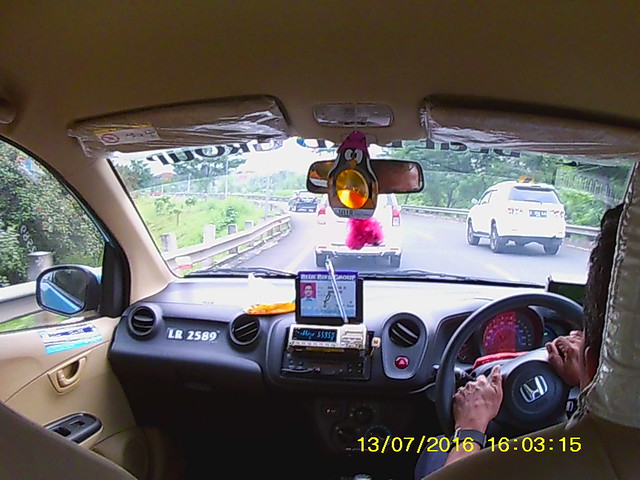
Silver bird is the top end posh service, running Mercs and other quality cars.
Their fares are about 1.5 times that of Blue bird.
Express are also generally good. Their cars, as with Blue bird, seem to be pretty well maintained and the drivers tend to be reasonable and honest.
Again, they always use the meter without being asked and, so far, they haven't messed about.
There are many other companies, many of which are probably fine but many are far less so.
I've seen rusty wrecks used as taxis and drivers I wouldn't trust as far as I could throw them.
However, I have used independents from time to time and some have been fine.
App based taxis
App based taxis have set up business in Indonesia, sometimes charging lower fares for journeys under a private hire ideal rather than taxis. Saying 'lower fare' check the ride app against Blue bird before you book. Many times Blue bird have been cheaper.
Public transport (Not taxis)
Indonesia has a wide range of public transport.
Transjakarta is a public bus service that will take you to most areas of the city.
It has links to other bus services that can get you to the satellite towns around Jakarta.
They've has some issues with reliability of vehicles, including fires that have destroyed several buses.
However, in general they're safe and fast because they have special bus lanes that other drivers can't use with risking a fine.
More information on this thread.
https://www.expat.com/forum/viewtopic.p … 19#3396576
Lukereg wrote:For Transjakarta you need to buy a 40k flazz card which can be dropped up at the TJ bus stops.
You should always take the second bus that comes as Indonesians crowd onto the first thing that comes along leaving the next often empty.
Intercity bus services.
Indonesia has a lot of intercity bus services, both air conditioned and not.
The non AC are generally old, dirty cattle trucks I would strongly advise you not to even consider.
The Air conditioned buses are mostly pretty good.
I generally recommend Sinar Jaya services because their buses are clean, tidy and well looked after.
I strongly suggest buy two tickets because the seats tend to be a little cramped if you're big, or sit next to someone wider than average.
I have had a couple of overtired drivers, but they are generally safe.
You'll also notice the very cheap prices they advertise.
There are many local bus services, all about the same.
Their buses are commonly in poor condition and their drivers tend to drive in a fashion that leads you to suspect they're suicidal.
Kopaja buses in Jakarta are numbered and have designated routes, but are mostly old and commonly very overcrowded.
They're very cheap and run all over the city.
You should take care of pickpockets on any and all crowded services.
This is a typical local bus in Central Java.
The floor is damaged, the buses are commonly overcrowded and you even get passengers hanging off the outside.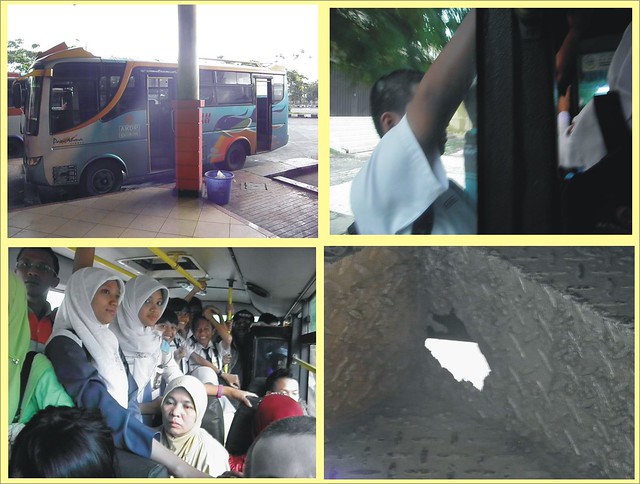
I would generally suggest avoiding these services if possible.
You should also note the vast majority of the local bus services allow buskers on. Most buskers are not especially good when it comes to singing, but a few can be very forceful when it comes to asking for money. A polite refusal is usually best and normally gets rid of them.
If you do give them cash, keep it to not more than Rp2,000 and never get large amounts of money out on these services.
NEVER get aggressive.
Horse and cart (No, I'm not joking)
Some of Jakarta's satellite towns still have these as working taxis, but most are just local rides for the kids.
In smaller towns they're still common forms of transport. You usually have to hammer out a price with the driver.
The horse and cart services were still operating as of December 2017
Go-jek and Grab bike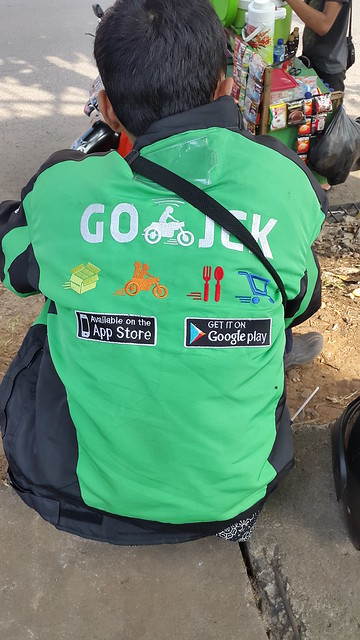
Go Jek and grab bike are motorcycle taxi services that use mobile apps to allow you to call transport to where ever your are.
The Go-jek and grab applications both ask for permission to use media, files, contacts lists and other private information.
I wouldn't advise installing any application that asks to access information they don't need to run their service.
Lukereg wrote:Hi GO-JEKERS!
Thank you for your never ending support for GO-JEK Indonesia. In an effort to give the very best services to our customers, new rates for GO-RIDE in JABODETABEK will be applied on December 29, 2015 at 00:00:
Rp. 12,000,- for 1-10 KM distance
Rp. 15,000,- for 10-15 KM distance
Rp. 2,000,-/KM for distance above 15 KM
You can download an intercity train app that allows you to book, then pay via a local bank ATM or a paypoint such as a mini mart
Trains (Intercity)
ALWAYS BOOK A TRAIN FOR AT LEAST AN HOUR BEFORE YOUR INTENDED ARRIVAL TIME - THEY'RE OFTEN LATE (Their timing has improved dramatically).
You will be asked for identification for all long distance services, this usually being your KTP or SKTT, but your passport will do nicely if you have yet to get another form of identification.
The executive class intercity trains are generally clean and comfortable, but I have never enjoyed the food, so I would strongly suggest you take a packed lunch.
These services are being improved all the time. They also serve drinks, my favourite being coffee at Rp. 11,000.
You must buy a Rp10,000 card to use the train card, but that's refundable at the end of your journey if you wish to cash it in. All stations also accept prepaid cards such as Flash and etoll.
I don't have a full list of fares at this point, but I know West Jakarta to Bintaro costs Rp2,000.
The trains are fine when they're quiet, but you're packed in like sardines at rush hour, making them a little unsafe.
I've seen a few women faint because of the extremely cramped conditions, heat and lack of air.
All the local commuter trains are equipped with air conditioning and all have ladies only carriages.
There is an excellent airport train service that calls at several stations in the Jakarta area and goes as far as Bekasi. The Jl. Jend Surdirman to airport trip takes less than ab hours, is cheap, and means you don't have traffic jams to worry about.
There is a free monorail that takes you from the train station to all Terminals.
I've tried several ways to reach the airport, the train being by far the easiest, fastest, and cheapest.
I strongly recommend using it.
Airports / Air travel / airlines
Indonesian airlines used to have a terrible reputation and a worse accident record, but that's changed a lot over the last few years.
Garuda, the national carrier was banned in many countries (including the whole of the EU) but Garuda is now listed as a five star airline.
My personal experience forces me to agree with this without reservation. Their service has been fantastic, the staff are nothing short of great, and the in flight food is delicious (Tell me that isn't a major shock for any airline)
They gained awards for the most improved airlines and the world's best cabin crews. I can see why.
Lukereg wrote:For travellers leaving jakarta, old town coffee and Starbucks are both 24hours and are towards gates starting with D.
Security checks also require removing watches belts keys etc and they are cracking down on liquids and sharp things as well. There are far more bag searches and far more security personnel. The army, police both uniformed and plain clothed are there. Porters are not allowed to ask for tips anymore but I suspect they do.
There is also a move to changing the minimum arrival time to check in for flights due to the improved security checks but it hasnt started get.
Soekarno-Hatta is a clean, modern airport with good facilities for the traveller, including easily available food from Indonesian and western outlets.
Terminal two is international flights.
More information here.
http://soekarnohatta-airport.co.id/
As Luke mentions above, airport security is a major priority, so good behaviour at any airport is a very good idea.
You will be asked to remove laptops from your bag before it goes through the xray machines.
I really shouldn't have to mention this but I saw it myself last July, so it's probably worth a moment.
Don't turn up drunk and loud at any airport here. That would get you into trouble at most airports, but it will go down extremely badly here, leaving you with a fair chance of spending the night in a cell and having to rebook your flight.
The drunk I saw got away with it, but almost didn't after he tried to justify himself to me immediately after the serious telling off he'd just had from an immigration officer.
That almost finished his journey, but he realised it was best to accept my advice and shut up before he got himself arrested. Even after that he was still chuntering to himself.
All that because he tried to push into a queue ahead of a family, with no one behind them.
Very foolish.
I will also add a note of thanks to the staff at terminal 2, Soekarno-Hatta for their assistance with my elderly mother.
They went out of their way to be as helpful as possible, even escorting her through passport control when they saw she was having difficulty walking.
Their kindness is very much appreciated.
Articles to help you in your expat project in Indonesia
 Working in Bali
Working in BaliThe multi-faceted island of Bali offers many opportunities for those who wish to move from tourist to ...
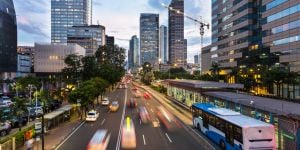 Driving in Indonesia
Driving in IndonesiaTraffic in Indonesia can be very overwhelming, particularly since the discipline and road conditions can ...
 Having a baby in Indonesia
Having a baby in IndonesiaIf you are about to have a baby in Indonesia, you should be aware that the medical services available to pregnant ...
 Moving to Indonesia with your pet
Moving to Indonesia with your petMoving to Indonesia with a pet is not a risk-free operation, mainly due to stray animals and rabies. ...
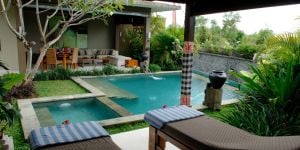 Accommodation in Bali
Accommodation in BaliIf you are planning to relocate to Bali, housing is a critical part of your project. So how to find your ...
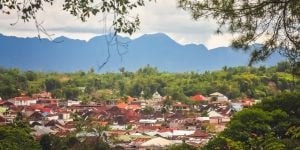 Accommodation in Indonesia
Accommodation in IndonesiaMany of the expatriates living in Indonesia prefer renting accommodation owing to the generally limited ...
 Buying property in Bali
Buying property in BaliShould your experience as an expatriate in Bali make you want to settle down permanently, you might want ...
 Internships in Indonesia
Internships in IndonesiaDo you wish to acquire hands-on experience, gain new professional skills and expand your international ...
Find more topics on the Indonesia forum







